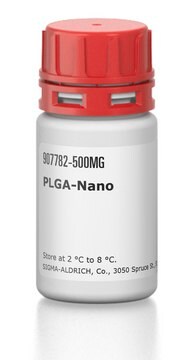추천 제품
설명
PLGA nanoparticle screening kit for synthesis of 100 and 200 nm particles
Quality Level
응용 분야
advanced drug delivery
저장 온도
2-8°C
일반 설명
NanoFabTx™ PLGA-nano reagent kit is a nanoformulation kit designed for the synthesis of specifically sized, drug-encapsulating poly(lactic-co-glycolic acid) (PLGA) nanoparticles. The NanoFabTx™ PLGA-nano reagent kit provides reagents (PLGA and stabilizer) and protocols to synthesize polymeric nanoparticles 75 to 200 nm in size. One protocol describes how to use the kit with standard glassware using a nanoprecipitation or solvent-displacement method. The second protocol describes how to use the kit with the NanoFabTx™ Microfluidic - nano device kit (Cat.No. 911593) for the fabrication of nanoparticles using microfluidic methods.
애플리케이션
With NanoFabTx™ PLGA-nano reagent kit, users can simplify their methods for PLGA nanoparticle synthesis and their drug loading experiments. Our protocols describe how to tune the synthetic parameters to achieve monodisperse nanoparticles 75 nm in size, 200 nm in size, or any size in between. As a result, the kit enables users to synthesize and test different particle sizes and identify the ideal size and drug loading of PLGA nanocarriers for their research application. The resulting particles are biocompatible and biodegradable and can be further modified to target specific tissues or to ensure slow and sustained drug release. PLGA is a biocompatible and biodegradable polymer that is approved by the FDA for biomedical and pharmaceutical applications and that is used widely in drug delivery systems for sustained release of many different types of therapeutic molecules. PLGA-based nanocarriers can be used to encapsulate both hydrophobic drugs like curcumin and lipophilic drugs like docetaxel. PLGA nanocarriers synthesized with the NanoFabTx™ kits are suitable for biomedical research applications such as oncology, immuno-oncology, gene delivery, and vaccine delivery. Polymeric nanoparticles are useful for intravenous or systemic delivery of drug molecules. For example, polymeric nanocarriers improve drug dissolution and solubility of hydrophobic and lipophilic drugs. In addition, the small size of polymeric nanocarriers make them much more likely than larger microparticles to bypass the reticuloendothelial system and complement system, usually leading to longer circulation half-lives. In addition, nanoparticles can pass through the blood-brain barrier, through tumor vasculature, and can enter cells via pinocytosis.
특징 및 장점
- Step-by-step protocols developed and tested by our formulation scientists
- Flexible synthesis tool to create uniform and reproducible nanoparticles
- Choose from standard glassware-based nanoprecipitation or microfluidic-based protocols
- Optimized to make nanoparticles 75-200 nm nanoprecipitation or microfluidics with low polydispersity
- Based on non-toxic, biodegradable polymers
법적 정보
NANOFABTX is a trademark of Sigma-Aldrich Co. LLC
관련 제품
제품 번호
설명
가격
Storage Class Code
11 - Combustible Solids
Flash Point (°F)
Not applicable
Flash Point (°C)
Not applicable
가장 최신 버전 중 하나를 선택하세요:
Gaurav Kumar et al.
Critical reviews in therapeutic drug carrier systems, 29(2), 149-182 (2012-04-06)
Drug-loaded polylactide-co-glycolide (PLGA) nanoparticles have been extensively studied and have a practical impact on drug delivery. Many PLGA-based nanoformulations have reached different stages of preclinical development; however, they present distinct challenges for researchers. This review discusses some of the challenges
Anil Mahapatro et al.
Journal of nanobiotechnology, 9, 55-55 (2011-11-30)
Biodegradable nanoparticles (NPs) are gaining increased attention for their ability to serve as a viable carrier for site specific delivery of vaccines, genes, drugs and other biomolecules in the body. They offer enhanced biocompatibility, superior drug/vaccine encapsulation, and convenient release
Francesca Ungaro et al.
The Journal of pharmacy and pharmacology, 64(9), 1217-1235 (2012-08-14)
The aim of this review is to summarize the current state-of-the-art in poly(lactic-co-glycolic acid) (PLGA) carriers for inhalation. It presents the rational of use, the potential and the recent advances in developing PLGA microparticles and nanoparticles for pulmonary delivery. The
L Martin-Banderas et al.
Mini reviews in medicinal chemistry, 13(1), 58-69 (2012-09-15)
This article presents the potential of PLGA nanoparticles for the oral administration of drugs. Different strategies are used to improve oral absorption of these nanoparticles. These strategies are based on modification of nanoparticle surface properties. They can be achieved either
Amit K Jain et al.
Critical reviews in therapeutic drug carrier systems, 28(1), 1-45 (2011-03-15)
Nanocarriers formulated with the US Food and Drug Administration-approved biocompatible and biodegradable polymer poly(lactic-co-glycolic acid) (PLGA) are being widely explored for the controlled delivery of therapeutic drugs, proteins, peptides, oligonucleotides, and genes. Surface functionalization of PLGA nanoparticles has paved the
문서
NanoFabTx™ platform accelerates drug development with ready-to-use formulations and microfluidic devices for particle synthesis.
NanoFabTX kits enable precise drug delivery with lipid nanoparticles and liposomes for mRNA and nucleic acids.
Professor Robert K. Prud’homme introduces flash nanoprecipitation (FNP) for nanoparticle fabrication, which is a scalable, rapid mixing process for nanoparticle formulations.
자사의 과학자팀은 생명 과학, 재료 과학, 화학 합성, 크로마토그래피, 분석 및 기타 많은 영역을 포함한 모든 과학 분야에 경험이 있습니다..
고객지원팀으로 연락바랍니다.



